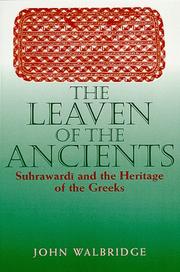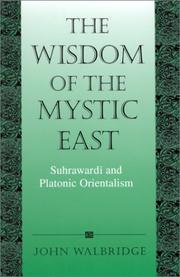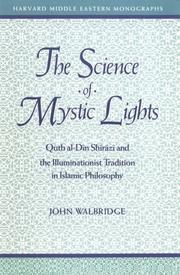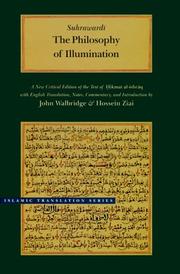| Listing 1 - 7 of 7 |
Sort by
|
Book
ISBN: 9780521195348 9780511761959 9781107641099 9780511992513 0511992513 0511761953 9780511988721 0511988729 0521195349 0511993722 110721453X 0511986920 0511990545 1282976567 0511991533 9786612976568 1107641098 Year: 2010 Publisher: Cambridge ; New York : Cambridge University Press,
Abstract | Keywords | Export | Availability | Bookmark
 Loading...
Loading...Choose an application
- Reference Manager
- EndNote
- RefWorks (Direct export to RefWorks)
"This book investigates the central role of reason in Islamic intellectual life. Despite widespread characterization of Islam as a system of belief based only on revelation, John Walbridge argues that rational methods, not fundamentalism, have characterized Islamic law, philosophy and education since the medieval period. His research demonstrates that this medieval Islamic rational tradition was opposed by both modernists and fundamentalists, resulting in a general collapse of traditional Islamic intellectual life and its replacement by more modern but far shallower forms of thought. However, the resources of this Islamic scholarly tradition remain an integral part of the Islamic intellectual tradition and will prove vital to its revival. The future of Islam, Walbridge argues, will be marked by a return to rationalism"--
Reason. --- Islamic philosophy. --- Logic. --- Faith and reason --- Faith and reason (Islam) --- Islam and reason --- Argumentation --- Deduction (Logic) --- Deductive logic --- Dialectic (Logic) --- Logic, Deductive --- Intellect --- Philosophy --- Psychology --- Science --- Reasoning --- Thought and thinking --- Arabic philosophy --- Muslim philosophy --- Philosophy, Islamic --- Philosophy, Arab --- Mind --- Rationalism --- Islam. --- Methodology --- Arts and Humanities --- Religion

ISBN: 0791443590 0791443604 9780791443606 Year: 1999 Publisher: New York: State university of New York press,
Abstract | Keywords | Export | Availability | Bookmark
 Loading...
Loading...Choose an application
- Reference Manager
- EndNote
- RefWorks (Direct export to RefWorks)
The twelfth-century Persian philosopher Suhrawardi was the key figure in the transition of Islamic philosophy from the neo-Aristotelianism of Avicenna to the mystically oriented Islamic philosophy of later centuries. Suhrawardi's "Illuminationist" philosophy was a vigorous reassertion of Neoplatonism at a time when Sufism was becoming a major presence in Islamic thought and society. This book traces the intellectual background of Suhrawardi's thought and of the Greek roots of non-Aristotelian philosophy in the Islamic world. Suhrawardi placed himself in an intellectual tradition that sprang from the "Ancients," the philosophical and mystical tradition of Hermes Trismegistus and his successors in both Greece and the Orient. The author argues that Suhrawardi typifies an approach to philosophy characteristic of Neoplatonism, in which Pythagoras is the key pre-Socratic, Plato is the central figure in the history of philosophy, Aristotle is respected but corrected by reference to Pythagoras and Plato, and philosophy is ultimately an eclectic revelation known symbolically by different nations. Mystical intuition is a key philosophical tool and symbolism is of particular importance. The Leaven of the Ancients provides a translation of Suhrawardi's famous dream, in which Aristotle reveals the epistemological foundations of Suhrawardi's Illuminationist system. The book also analyzes the role played by Suhrawardi and his approach to philosophy in turning Islamic civilization away from physical science toward a subtle mystical psychology, thus offering a new explanation for the decline of science in Islam.

ISBN: 079145052X 9780791450529 Year: 2001 Publisher: New York: State university of New York press,
Abstract | Keywords | Export | Availability | Bookmark
 Loading...
Loading...Choose an application
- Reference Manager
- EndNote
- RefWorks (Direct export to RefWorks)
An expert on the thought if medieval Islamic philosopher Suhrawardi argues that philosophers have romanticized this work as a revival of oriental wisdom.

ISBN: 9780932885067 0932885063 Year: 1992 Publisher: Cambridge (Mass.): Harvard university press,
Abstract | Keywords | Export | Availability | Bookmark
 Loading...
Loading...Choose an application
- Reference Manager
- EndNote
- RefWorks (Direct export to RefWorks)
Digital
ISBN: 9780511761959 Year: 2011 Publisher: Cambridge Cambridge University Press
Abstract | Keywords | Export | Availability | Bookmark
 Loading...
Loading...Choose an application
- Reference Manager
- EndNote
- RefWorks (Direct export to RefWorks)
Book
ISSN: 15697401 ISBN: 9789004356580 9004356584 9004358390 9789004358393 Year: 2018 Volume: 16 Publisher: Leiden ;Boston Brill
Abstract | Keywords | Export | Availability | Bookmark
 Loading...
Loading...Choose an application
- Reference Manager
- EndNote
- RefWorks (Direct export to RefWorks)
The late Professor Hossein Ziai's interests focused on the Illuminationist (Ishrāqī) tradition. Dedicated to his memory, this volume deals with the post-Avicennan philosophical tradition in Iran, and in particular the Illuminationist school and later philosophers, such as those associated with the School of Isfahan, who were fundamentally influenced by it. The focus of various chapters is on translations, editions, and close expositions of rationalist works in areas such as epistemology, logic and metaphysics rather than mysticism more generally, and also on specific texts rather than themes or studies of individual philosophers. The purpose of the volume is to introduce new texts into the modern canon of Islamic and Iranian philosophy. Various texts in this volume have not been previously translated nor have they been the subject of significant Western scholarship
Ishrāqīyah --- Islamic philosophy --- Ishrāqīyah. --- Arabic philosophy --- Muslim philosophy --- Philosophy, Islamic --- Philosophy, Arab --- Illumination (Islam) --- Illuminism (Islam) --- Ishrāq --- Sufism --- Suhrawardī, ʻAbd al-Qāhir ibn ʻAbd Allāh, --- Suhrawardī, Abū al-Najīb ʻAbd al-Qāhir, --- سهروردي، عبد القادر بن عبد الله --- سهروردي، عبد القاهر بن عبد الله --- سهروردي، عبد القاهر بن عبد الله، --- Islamic philosophy - Iran

ISBN: 0842524576 9780842524575 Year: 1999 Publisher: Provo: Brigham Young university press,
Abstract | Keywords | Export | Availability | Bookmark
 Loading...
Loading...Choose an application
- Reference Manager
- EndNote
- RefWorks (Direct export to RefWorks)
| Listing 1 - 7 of 7 |
Sort by
|

 Search
Search Feedback
Feedback About UniCat
About UniCat  Help
Help News
News